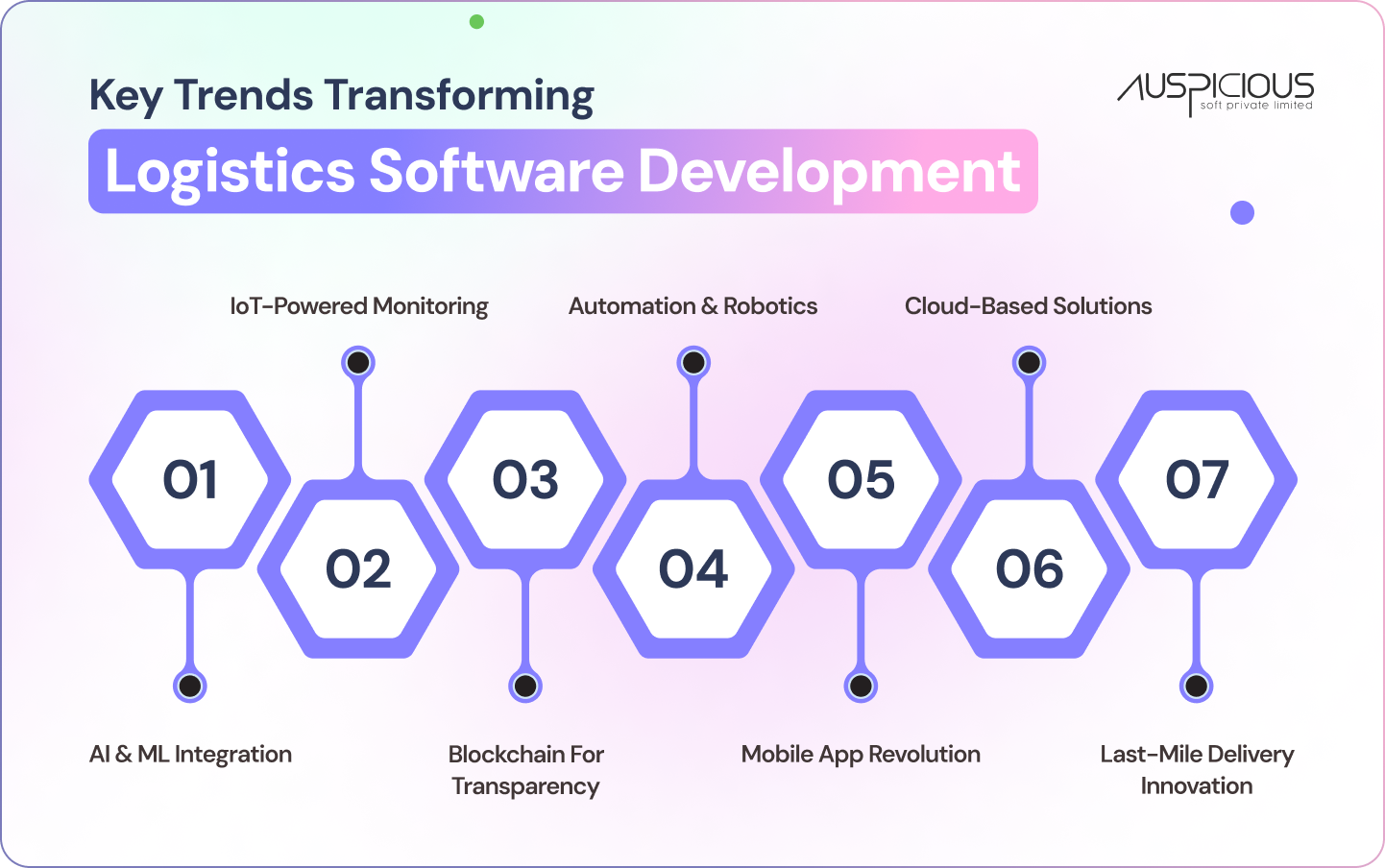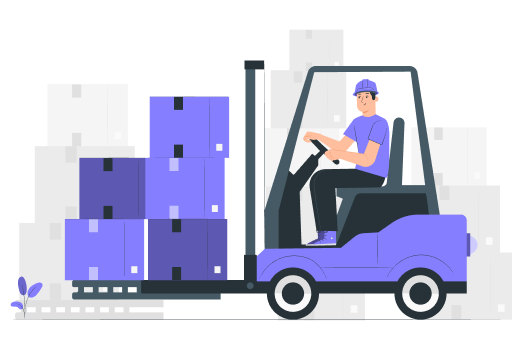Logistics Software Development: A Complete Guide to Market & Trends
The growing need for logistics software development is driven by the expanding e-commerce market. As e-commerce businesses expand and cover a larger market area, the volume of orders increases, leading to a more complex supply chain, and delivering excellent customer service becomes burdensome.
As a result, more streamlined and automated logistics software is needed in the market to relieve organisations of repetitive, mundane, and manual tasks, to reduce the risk of errors, and, most importantly, to increase profitability.
This post will provide a deeper understanding of the significance of the logistics software development company and the core software solutions that will enhance business and customer satisfaction, increase profit margins, and help users cover more ground over a shorter period.
Businesses Need Software Development Solutions
To gain better insight, logistics software development companies increase efficiency considerably. Businesses now rely on developers for logistics software to guarantee the following:
These goals can also be easily met with IoT devices, where order processing for e-commerce, inventory tracking, and fleet management can be accomplished through the merging of IoT technologies.
Software developers who deal directly with business clients know that one of the most common tasks with e-commerce orders within the scope of logistics management is order tracking. Effective logistics software will enhance the experience and enable business clients to track order status in real time.
Key Market Trends in Logistics Software Development

The lack of real-time tracking of orders increases costs by as much as 15% due to the confusion of not knowing where an order is at any point. Enhanced logistics software development companies also prevent errors such as overbilling, which affects customer satisfaction, and help avoid the waiting times of business clients.
The systems will automate repetitive tasks and alleviate manual work as much as possible, increasing customer satisfaction. Also, timely delivery ensures the correct allocation of freight costs and greatly diminishes wait times and overhead costs.
– Optimise costs: Reduce the amount of fuel consumed, improve delivery routes, and reduce downtime.
–Ensure regulatory compliance: Control safety rules, driving hours, and international shipping regulations.
-Improve customer experience: Provide precise delivery time ranges and real-time tracking of the shipment.
Logistics software solutions start from warehouse management and go all the way to last-mile delivery of e-commerce packages.
Logistics Software Development Major Market Changes
The market of logistics software is changing quickly thanks to evolving technologies that change how companies run their supply chains. This list covers new primary changes influencing logistics software development.
1. Inclusion of AI and ML
AI-powered logistics software is changing supply chain operations for the better with improved predictive analytics, demand forecasting and route optimisation. Machine learning algorithms will allow them to anticipate delays and resource overuse and make better decisions.
2. IoT for Monitoring
These IoT logistics solutions increase real-time visibility by enabling the tracking of vehicles, shipments and even inventory. These innovations in technology allow the use of sensors and GPS devices that can provide real-time updates, allowing companies to keep track of the conditions under which goods are delivered.
3. Blockchain for Supply Chain Transparency
Blockchain is becoming increasingly popular with logistics software developers as it supports security, transparency, and data integrity. Companies can implement blockchain-based tracking systems that reduce fraud, increase accountability, and ease cross-border trade.
4. Automation & Robotics in Warehousing
The use of Automated warehouses and robotic picking systems is becoming a prerequisite for logistics companies these days. Robotic-powered logistics software incorporates Warehouse Management Systems (WMS) to enhance storage space utilisation, inventory control, and order processing.
5. Android App Development for Logistics Operations
The mobile revolution has made Android applications an indispensable tool for enhancing logistics operations. Mobile applications allow for tracking in real-time, fleet management, electronic proof of delivery (ePOD), and issues of communication with drivers. Logistics apps help businesses become more productive by providing real-time information and instant instructions for coordinated activities.
6. Cloud Based Logistics Solutions
Remote cloud servers are an absolutely vital part of new-age logistics software because they provide scalability, security, and remote access to data. Cloud-based logistics platforms have centralised dashboards and enable seamless integration as well as tracking across multiple locations, making it easy to manage business operations.
7. Making The Most Out of Last-Mile Delivery
Among the many challenges that logistics faces, last-mile delivery optimisation is at the top. Advanced logistics software uses drone delivery systems, AI-based route optimisation and self-driving vehicles to improve delivery speed and overall customer experience.
An Overview of Features that Logistics Software Development Should Offer
Businesses that operate in the logistics industry need well-rounded logistics software to ensure their operations are efficient. Here are some of the key features that are required:
1. Fleet Management & GPS Tracking
-Vehicles can be monitored through GPS, including their current location.
-Optimisation of the route to save on fuel.
-Dispatching and scheduling of vehicles for trips is done automatically.
2. Warehouse Management System (WMS)
-Keeping an eye on inventory and its movement.
-Automated processing of orders received.
-Using Barcode and RFID Technology for scanning.
3. Transportation Management System (TMS)
-Planning and tracking of logistics for the freight.
-Selecting carriers at a low price.
-Scheduling shipping and notifying in real-time.
4. Artificial Intelligence & Predictive Analytics
-Automated demand estimation by AI technologies.
-Automatic decision-making from data supplied in real-time.
-Predictions for routes and timings for delivery.
5. Mobile Applications for Logistics
-App development on Android for communications and fleet management.
-Confirming deliveries through electronic signatures.
-Monitoring of drivers for performance.
6. Cloud-Based Access & Security
-Allowing real-time collaboration through multi-user access.
-Encryption of data and security measures.
-Architecture with the ability to scale out for business expansion.
7. Customer Portal & Real-Time Notifications
-Allows tracking systems without restrictions.
-Alerts concerning UK time of arrival (ETA).
-Emails automatically update.
A streamlined logistics software ensures different aspects of a business can be optimised while improving the visibility, security, and cost-effectiveness of the company.
Importance of Android Mobile Apps in Logistics Software Development
Android app development is very important for logistics software because it provides users with mobile access and communication features. More and more logistics companies are using custom Android apps for:
-Monitoring Drivers and Fleets – Route and fuel tracking, as well as vehicle performance.
-Warehouse Management – Worn-out stock harvesting, order barcode scanning, and order automation processes.
-Delivery Tracking – Updating and forwarding ‘proof of delivery’ forms.
-Client Interaction – Customers can monitor their orders, and notifications can be sent to customers.
Apps on mobile devices enhance productivity, efficiency, and the experience of the user. Thus, they have become an indispensable part of modern logistics software design and Android app development.
Wrapping up
The world has moved on from traditional processes to more elaborate ones. This world of complexities and advanced human interactions is driven by a logistics software development company that seeks to provide better optimisation and enhanced customer service. Add-ons such as Android app development, Artificial Intelligence, the Internet of Things, Blockchain technology, and automation are transforming the world of logistics for good and enabling companies to live without the fear of lagging behind the competition.
Cloud computing is here, and the logistics industry will be forever changed. With the invention of mobile applications and predictive analytics, logistics will soon be easier, smarter, and far more automated. Companies that apply these advancements will have a great competitive advantage with faster delivery speeds, lower operational costs, and high levels of customer satisfaction.
TABLE OF CONTENT
- Logistics Software Development: A Complete Guide to Market & Trends
- Businesses Need Software Development Solutions
- Key Market Trends in Logistics Software Development
- Logistics Software Development Major Market Changes
- An Overview of Features that Logistics Software Development Should Offer
- Importance of Android Mobile Apps in Logistics Software Development
- Wrapping It Up!
